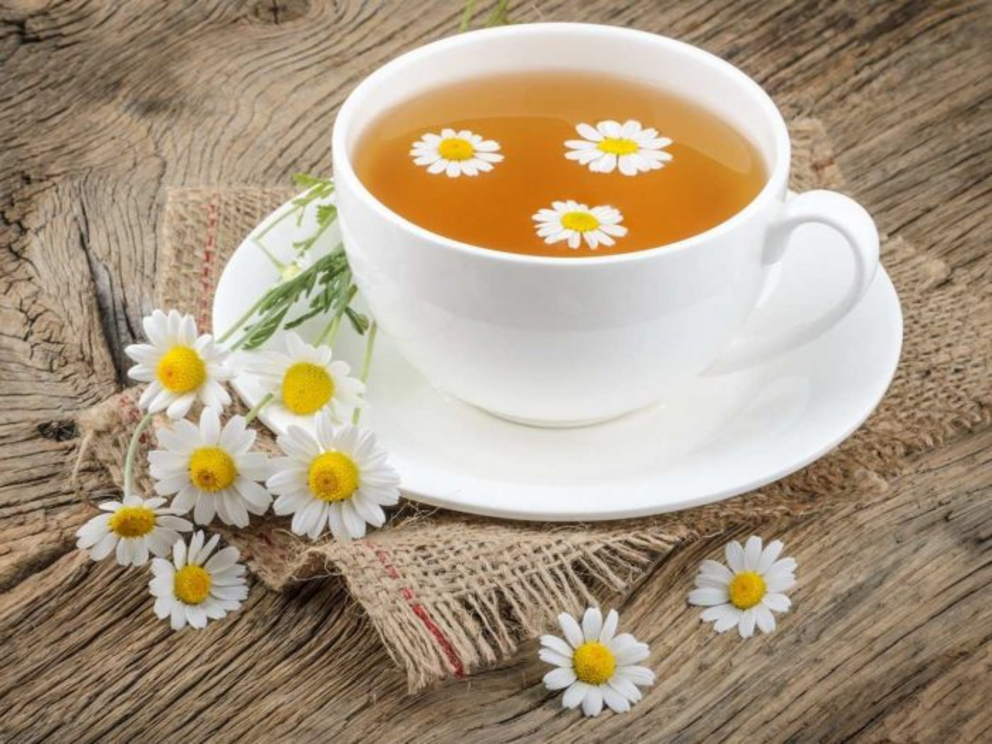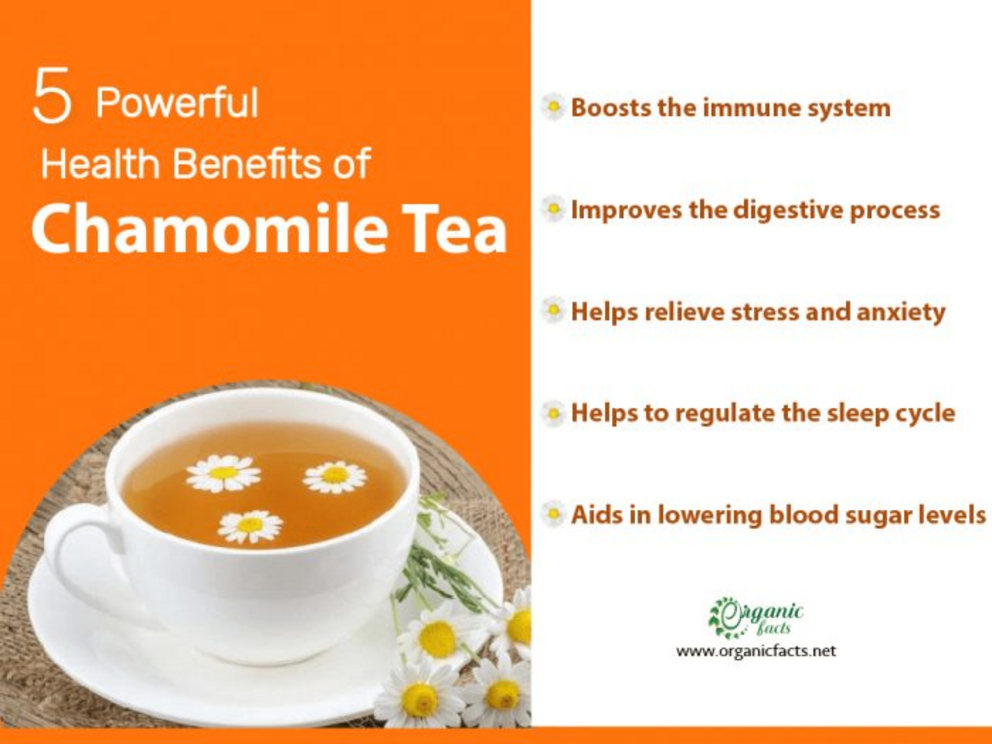11 best benefits of chamomile tea
Medically reviewed by Vanessa Voltolina (MS, RD)
Chamomile tea or manzanilla tea is a popular variety of tea that is loaded with antioxidants. The top health benefits of chamomile tea can include the ability to regulate sleep, aid in digestion, boost immunity, protect the skin, lower stress levels, and soothe menstrual cramps. Due to its anti-inflammatory nature, it may also help assuage diarrhea and bloating.
What is Chamomile Tea?
Derived from the Asteraceae family of plants, dried chamomile flowers are used for different natural remedies and healing poultices. Their most popular form is tea.
The Spanish name for this tea is manzanilla tea. These plants come in many forms, so chamomile tea found in one part of the world may not be the same as somewhere else, but the fundamental components are quite similar and provide similar effects.
Studies have found that German chamomile flowers tend to have the strongest concentrations of beneficial compounds and nutrients that can be imparted to those who drink this popular tea regularly. [1]
Chamomile tea has a pleasant earthy and floral taste. It is well-known for its health benefits. The presence of flavonoids, sesquiterpenes, (often associated with antiseptic, antibacterial, or anti-inflammatory properties) and other powerful antioxidants in this tea have significant effects on the human body.
While it is commonly consumed as a beverage, chamomile extract is also used in capsules and aromatherapy oils. Chamomile lotion is topically applied in certain cases to get relief from various skin problems. Baby products such as soaps, shampoos, and wipes are popular due to their soothing nature. [3]
Nutrition Facts
Beverages, tea, herb, brewed, chamomile
Serving Size :
NutrientValue
Water [g]99.7
Energy1
Energy [kJ]4
Ash [g]0.01
Carbohydrate, by difference [g]0.2
Calcium, Ca [mg]2
Iron, Fe [mg]0.08
Magnesium, Mg [mg]1
Potassium, K [mg]9
Sodium, Na [mg]1
Zinc, Zn [mg]0.04
Copper, Cu [mg]0.02
Manganese, Mn [mg]0.04
Thiamin [mg]0.01
Riboflavin [mg]0
Pantothenic acid [mg]0.01
Folate, total [µg]1
Folate, food [µg]1
Folate, DFE [µg]1
Vitamin A, RAE [µg]1
Carotene, beta [µg]12
Vitamin A, IU [IU]20
Fatty acids, total saturated [g]0
16:0 [g]0
Fatty acids, total monounsaturated [g]0
18:1 [g]0
Fatty acids, total polyunsaturated [g]0.01
18:2 [g]0
18:3 [g]0
Sources include : USDA [4]
Chamomile Tea Nutrition
According to the USDA National Nutrient Database for Standard Reference, chamomile tea contains negligible amounts of many vitamins and minerals potassium, magnesium, calcium, sodium, thiamin, riboflavin, and vitamin A. Other nutrients include folate, iron, and zinc. One cup (237 ml) of brewed chamomile tea provides 2 kcal of energy, 0.47 g of carbohydrates. [5]
To make the tea, read our Freshly Brewed Chamomile Tea Recipe.
Health Benefits
Let’s take a closer look at the benefits of drinking chamomile tea.
May Induce Sleep
According to research published in The Journal of Clinical Pharmacology, chamomile tea can be used as an overall sleep aid, particularly for people who struggle with sleep apnea and restless sleep. Drinking a warm cup of non-caffeinated chamomile tea can help you fall asleep faster and wake up feeling more refreshed. It is highly recommended for new mothers post-childbirth to improve the quality of their sleep. [6]
You can know more about 7 Best Teas For A Good Night’s Sleep here.
 A soothing cup of chamomile tea is great for putting yourself to sleep.
A soothing cup of chamomile tea is great for putting yourself to sleep.
May Reduce Inflammation
If you are suffering from stomach irritation, ranging anywhere from mild bloating to irritable bowel syndrome (IBS) symptoms, chamomile tea can be a major help. The possibly strong antispasmodic and anti-inflammatory properties of chamomile can be highly effective in treating stomach and intestinal cramps. Consuming manzanilla tea regularly can help in lessening problems like IBS, nausea, muscle spasms, stomach flu, and gastroenteritis. According to information from Kathi J Kemper, MD, MPH, Ohio State’s Wexner Medical Center, it has anti-inflammatory properties that may help ease the twisting nature of your gut and allow for the passage of gas and smoother bowel movements. It might also alleviate stomach ulcer pains and spasms. [7]
May Manage Diabetes
Research published in the Journal of Agricultural and Food Chemistry has shown that chamomile tea can be useful for people suffering from diabetes. Perhaps by helping lower blood sugar levels and regulating the amount of insulin in the blood, the powerful organic chemicals in it can help to eliminate massive drops and spikes in blood sugar, as per another study published in the Journal of Endocrinological Investigation in 2015. [8] [9]
May Promote Heart Health
Research published from Tufts University in Boston, MA, reveals that chamomile tea can help lower blood pressure and LDL (bad) cholesterol levels, making your heart healthier. Another research study reveals that it may also reduce the occurrence of various cardiovascular issues. [10] [11]
May Boost Immune System
The phenolic compounds that may be present in chamomile tea can help to strengthen your immune system and ward off infections. The other compounds present in chamomile tea may also fight cold, flu, and sinus issues, ultimately, relieving congestion. [12]
May Relieve Stress & Anxiety
One of the most popular uses of manzanilla tea can be providing relief from stress and anxiety. After a long day at work, the warm, soothing nature of this beverage can help increase the levels of serotonin and melatonin in your body. These hormones can successfully eliminate stress and worry. [13]
According to a U.S. Journal, it can also provide relief from migraines and headaches. As imbibing this tea is also relaxing, it can help slow down your mind and eliminate the classic symptoms of anxiety. One to two cups of chamomile tea per day can significantly act against chronic stress. Research suggests that chamomile tea can also help relieve the symptoms of depression in postpartum women. [14] [15]

Did you know that the Spanish name for this tea is manzanilla tea?
May Aid In Skin Care
Due to the anti-inflammatory and antioxidant-rich nature of chamomile tea, it is not exclusively used as a beverage. The topical application of manzanilla tea can alleviate irritations and even skin conditions such as eczema.
It can also significantly improve healing and lessen the appearance of blemishes and wrinkles on the face. By eliminating oxidative stress and boosting the immune response, it can do wonders for your skin. [16]
May Prevent Osteoporosis
Chamomile extract can help to stimulate the activity of osteoblasts, the cells which build bones. Thus, the tea can help increase bone density and may mediate the detrimental effects of osteoporosis. [17]
May Relieve Menstrual Pain
The anti-inflammatory nature of chamomile tea can make this relaxant a popular choice for women dealing with the symptoms of menstruation, think bloating, cramping, anxiety, sweating, inability to sleep, and mood swings. [18]
Potentially Anti-allergic Properties
Chamomile tea can help modulate the immune response to allergens in the body. By working as a potential antihistamine, it can soothe these allergic reactions throughout the body. [19]
May Provide Relief in Hemorrhoids
Along with providing a soothing effect, chamomile tea can also help with hemorrhoids and seizures. [20]
Word of Caution: Caution is advised to pregnant and breastfeeding women as excessive consumption of this tea may result in a miscarriage. According to the National Institute of Health (NIH), it can cause allergic reactions and can also lead to drowsiness, eye irritation, vomiting, and nausea. So, always drink this tea in moderation. You can learn more about the Top 4 Chamomile Tea Side Effects here. [21] [22]

